NOT YOUR AVERAGE CHATBOT
Conversational AI
Chatbots and virtual assistants are very helpful for automating some types of customer communications. But how is the average chatbot different from its more evolved cousin, conversational AI? Book a product tour to learn more!
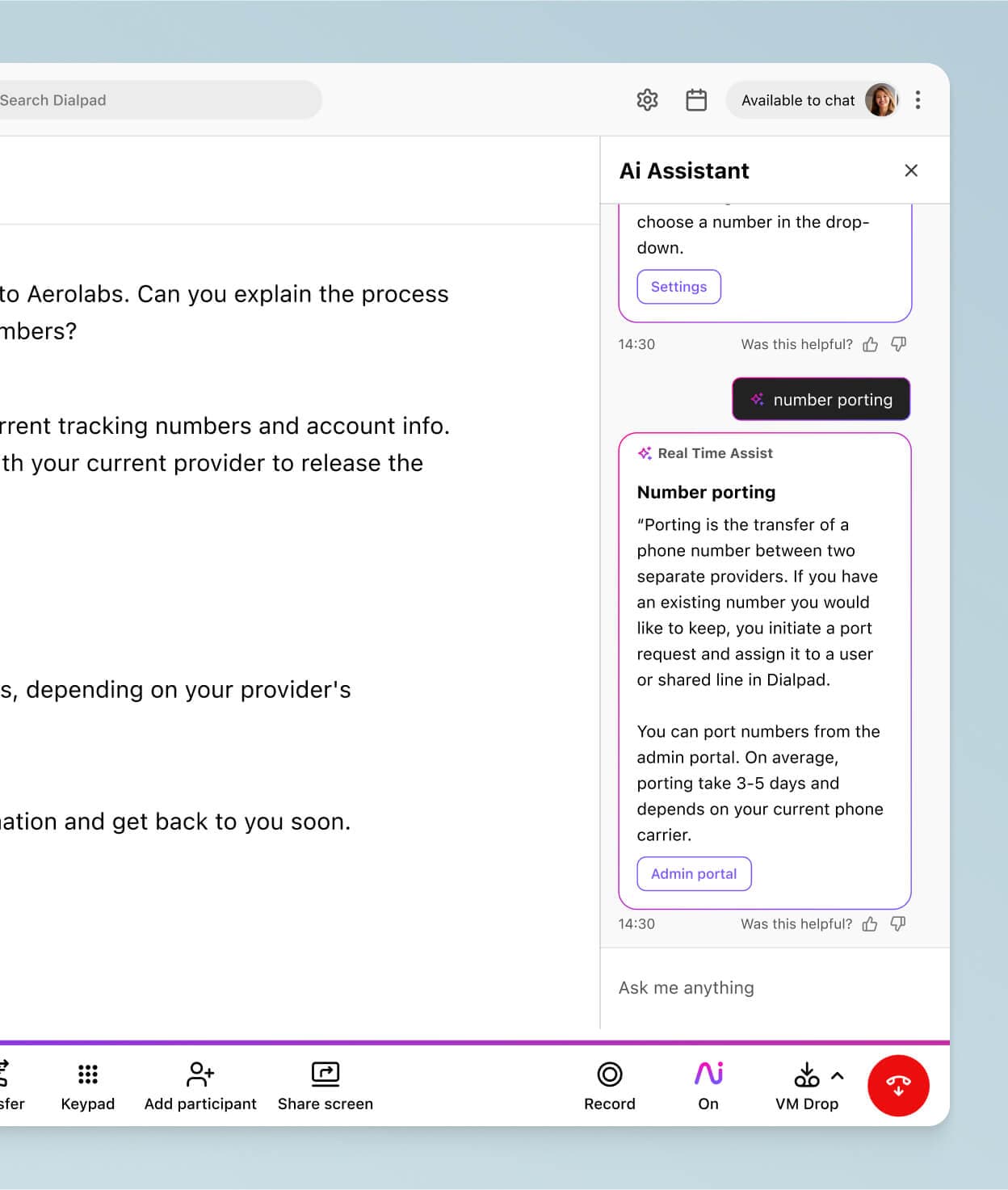
What is conversational AI?
Conversational AI (artificial intelligence) uses natural language processing (NLP) and machine learning to essentially simulate natural-sounding conversations with computer programs.
Instead of having a rigid set of standard answers that responds to preset questions or inputs (like traditional chatbots), conversational AI can provide more varied, context-dependent responses.
Through advanced machine learning, ASR (automatic speech recognition), natural language processing (NLP), and natural language understanding (NLU) technology, conversational AI can provide even more accurate answers and resolutions for customers than your typical chatbot—with less human error and more human-sounding dialogue.
For example, with a traditional chatbot, a customer would have to choose between multiple choice answers to a preset question, like “Refund,” “Support,” and so on in response to “How can I help you today?” From there, they’d go down the branches of that question tree to (hopefully) resolve their issue. Not the best conversational experience.
Conversational AI, on the other hand, is much better at understanding more complex needs and conversational styles via NLP and deep learning, and keeps getting smarter as it learns more about patterns or frequently asked questions from customers. (Learn more about NLP in customer service.)
It can then pivot its responses and optimise as needed to give customers the answers they need without having to involve a human agent, which extends your customer self-service even further.
This year, millions are forecasted to be using voice assistants, and it will likely continue to grow as technology progresses.
👉 Fun fact:
A good omnichannel contact centre platform should have built-in conversational AI (along with other unique AI solutions) that can optimise workflows and even spot gaps in training materials and knowledge databases, and recommend that a company add more information there to handle customer questions.
How does conversational AI work in Dialpad?
Chatbots used to "talk to" customers by essentially matching preset answers to preset yes/no or multiple choice questions.
Today, conversational AI for customers takes things a step further. Here's what Dialpad Ai can do, for instance:
Search databases and FAQ pages for answers to customer questions.
Search unstructured sources of data, like PDF documents and past customer conversations—almost no other options on the market can do this!
Create intricate dialogues on your website, and even integrate rich media and video content.
Let you build automations and workflows in minutes—no coding needed.
And a lot more...
🤖 For example:
If a customer has a tough question about something that has never been covered on your company's FAQ page, but another customer has asked a similar question before, Dialpad can show an agent that past transcript to help them! Not only does conversational AI empower your human agents and customer support teams, it also improves customer satisfaction and creates a better customer experience overall, especially when complemented by other self-service options and automations.
More than just a conversational AI platform
So, how does Dialpad’s deep learning and AI technology make its customer engagement platform one of the best out there? Here are a few examples of what you can do with it.
Easy no-code setup
Incorporating things like text-to-speech algorithms into workflows doesn’t require as much specialist knowledge as you might imagine. With Dialpad, you can easily set up virtual agents and deploy a conversational AI solution just by dragging and dropping. You get an intuitive user experience without a super-complicated conversational AI system for developers.
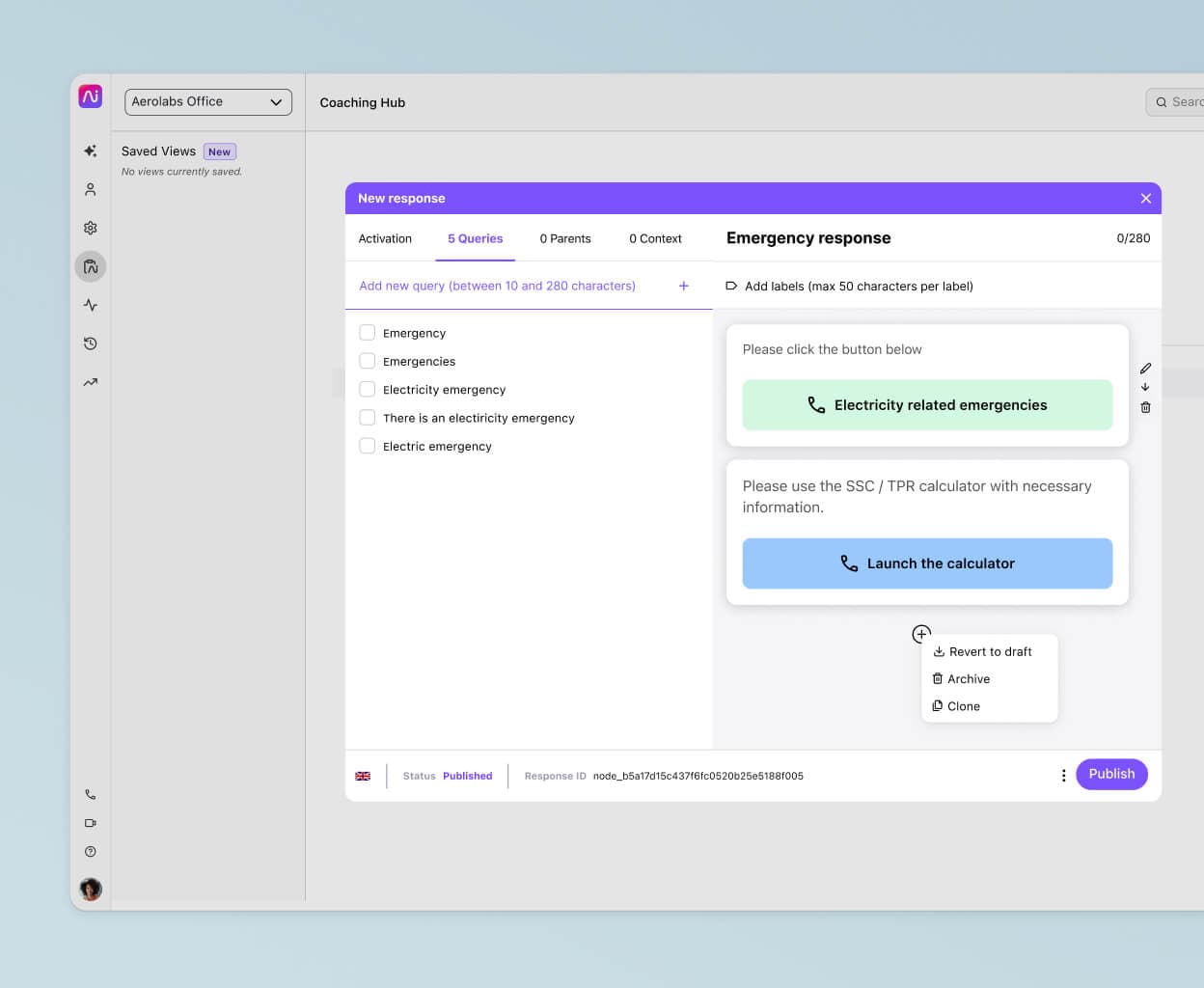
Real-time transcription
With Dialpad's AI-powered natural language understanding, it can transcribe your voice conversations in real time. No more trawling through hours of recorded conversations trying to find that one thing someone said.
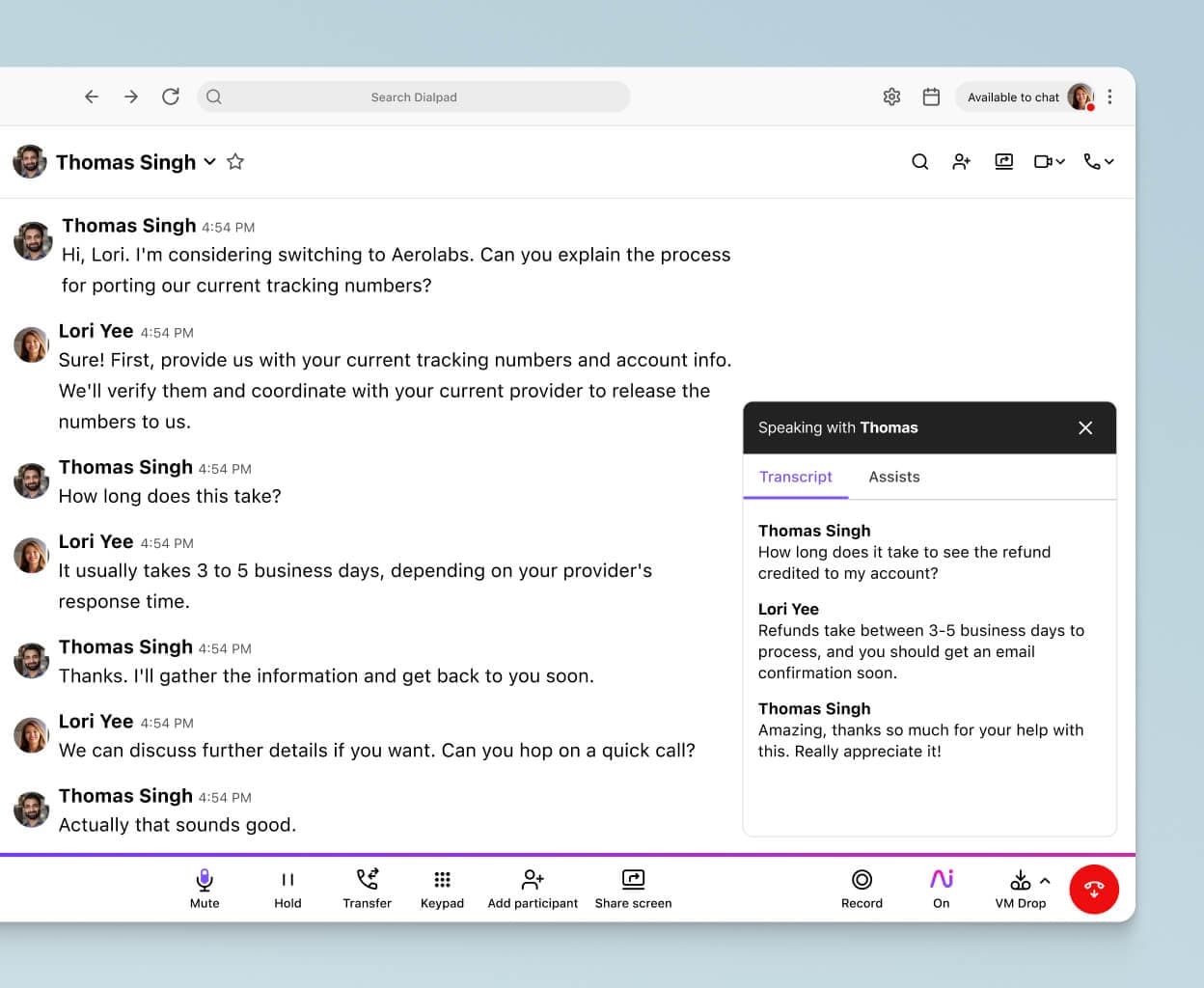
Ai Recaps for every meeting
Not only that, Dialpad Ai also automatically generates a call summary, powered by DialpadGPT, with a short recap in natural language after your meetings—no note-taker needed.
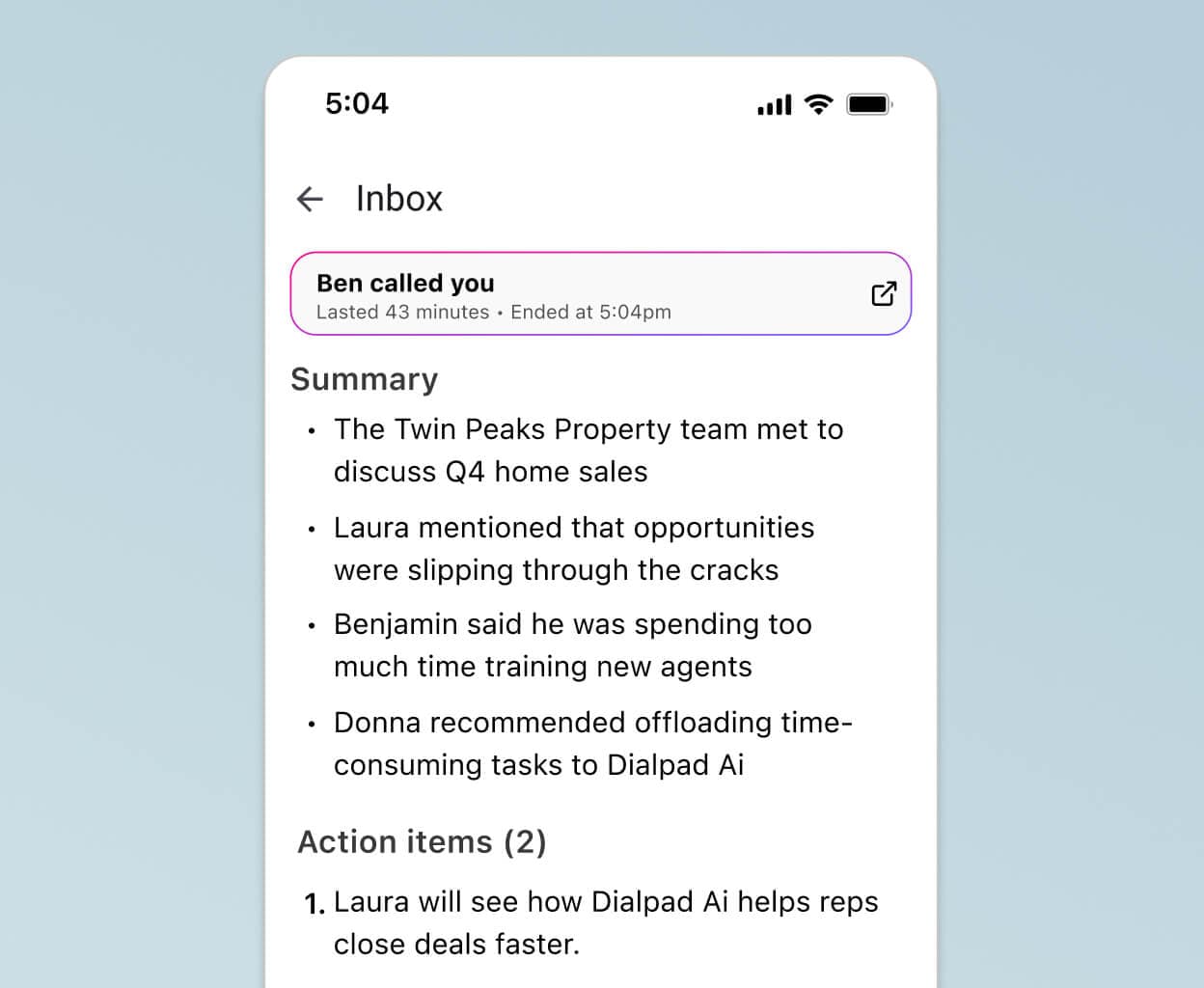
Live sentiment analysis
Dialpad can also do sentiment analysis—again, in real time. This way, supervisors who are overseeing multiple agents on active calls can quickly see if a call is going south, open up the live transcript to get more context, and then decide if they need to jump in to help the agent.
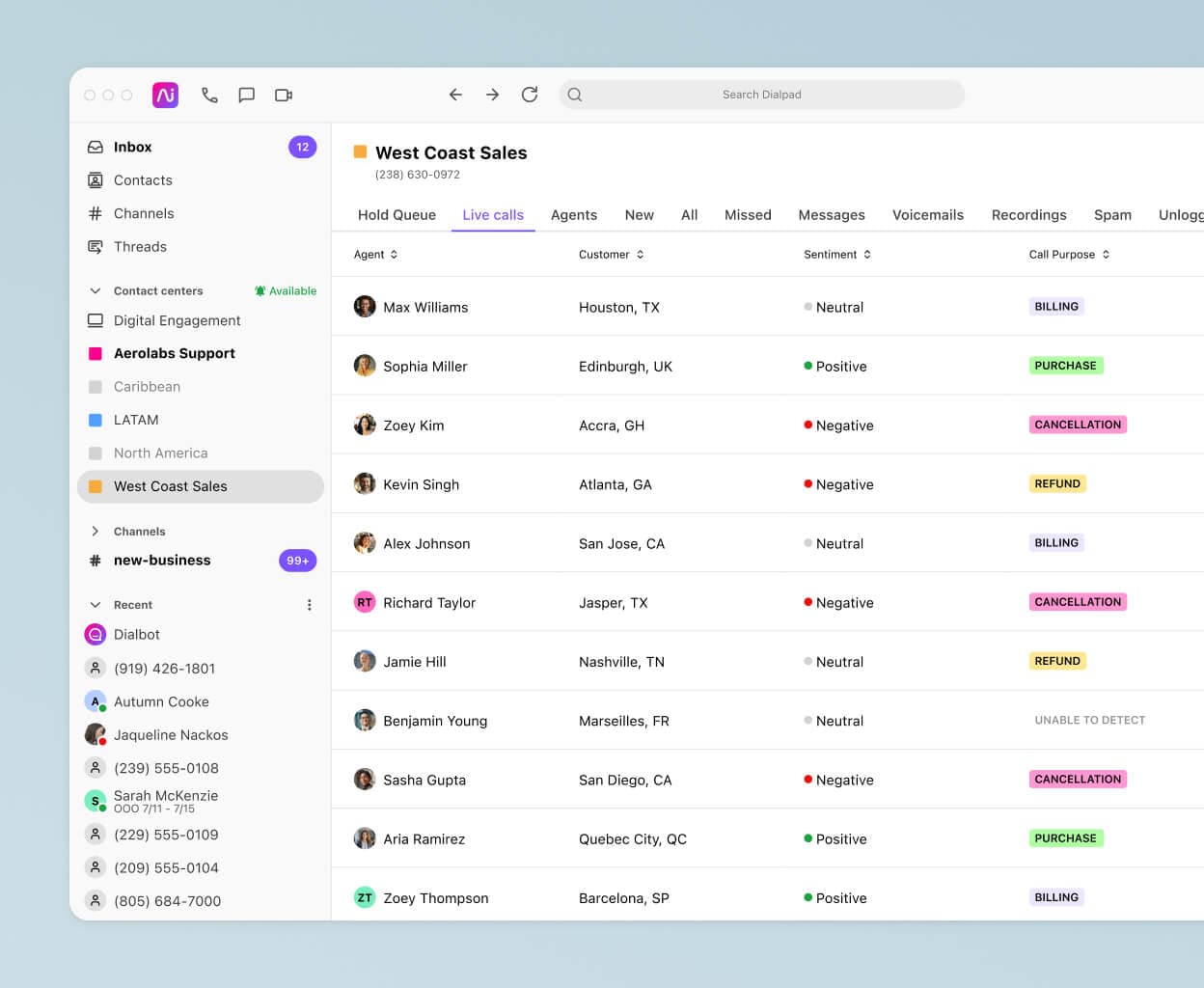
Real-time agent assists
Even the best conversational AI platforms don't always have this, but real-time assists (aka. screen pops) are an important component in conversational AI contact centre technology. With Dialpad, managers can create RTA (Real-Time Assist) cards with tailored notes on specific topics and set them to pop up automatically on agents’ screens when certain trigger words or phrases are spoken.
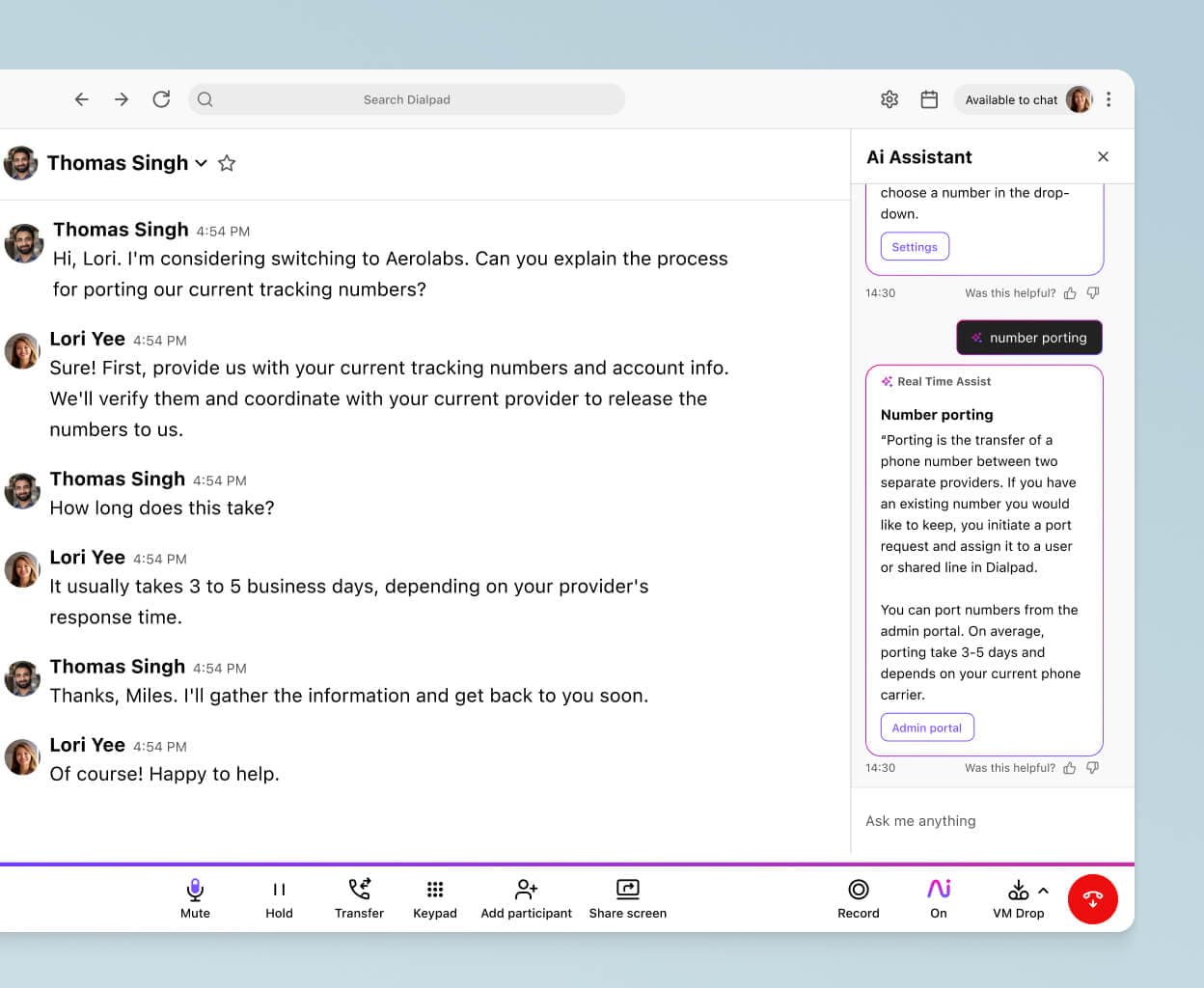
Omnichannel communications
Besides conversational AI functionality, Dialpad also lets agents and supervisors provide a full omnichannel experience, from a single pane of glass. Manage the AI chatbot straight to a website, send an instant or SMS message, and even handle social media messaging on platforms like Facebook Messenger and WhatsApp.
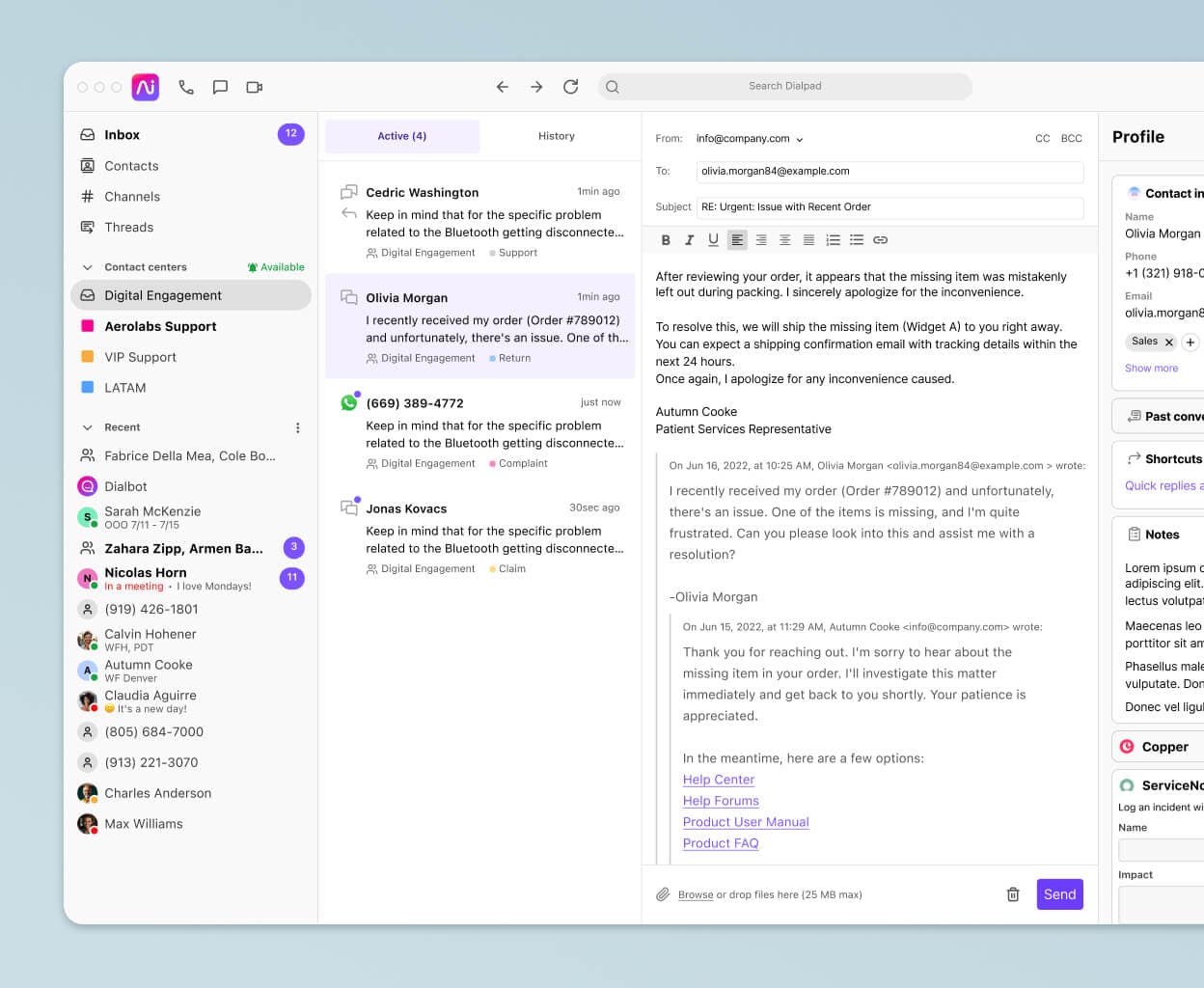
Custom call routing
Some conversational AI tools have robust routing features that help optimise call flows through things like interactive voice response (IVR) menus. With Dialpad, you can route incoming calls to the agent who's been idle the longest, by skill level, and more. Plus, the chatbot or conversational AI feature also lets your customers escalate the call, meaning they can easily route themselves to a human agent through a voice or video call if they decide that they're not getting what they need from conversational AI.
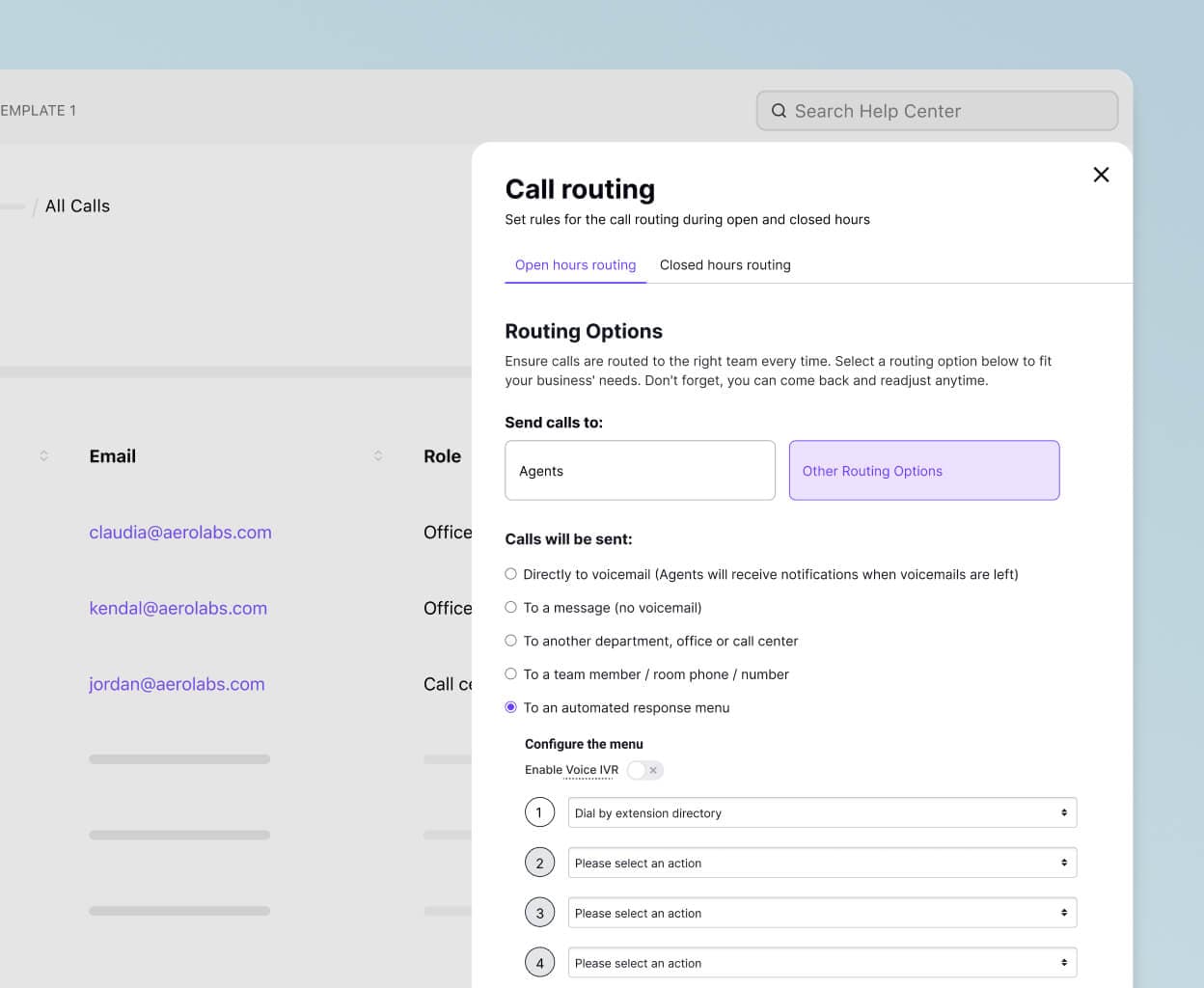
Enterprise-grade security
Your conversational AI platform provider should be secure. After all, it's handling conversations and may take down information from your customers, not to mention some industries have specific compliance requirements like GDPR and HIPAA. Dialpad helps you stay compliant with these and more, has in-meeting security controls, lets you set up custom data retention policies, and also has robust encryption standards.
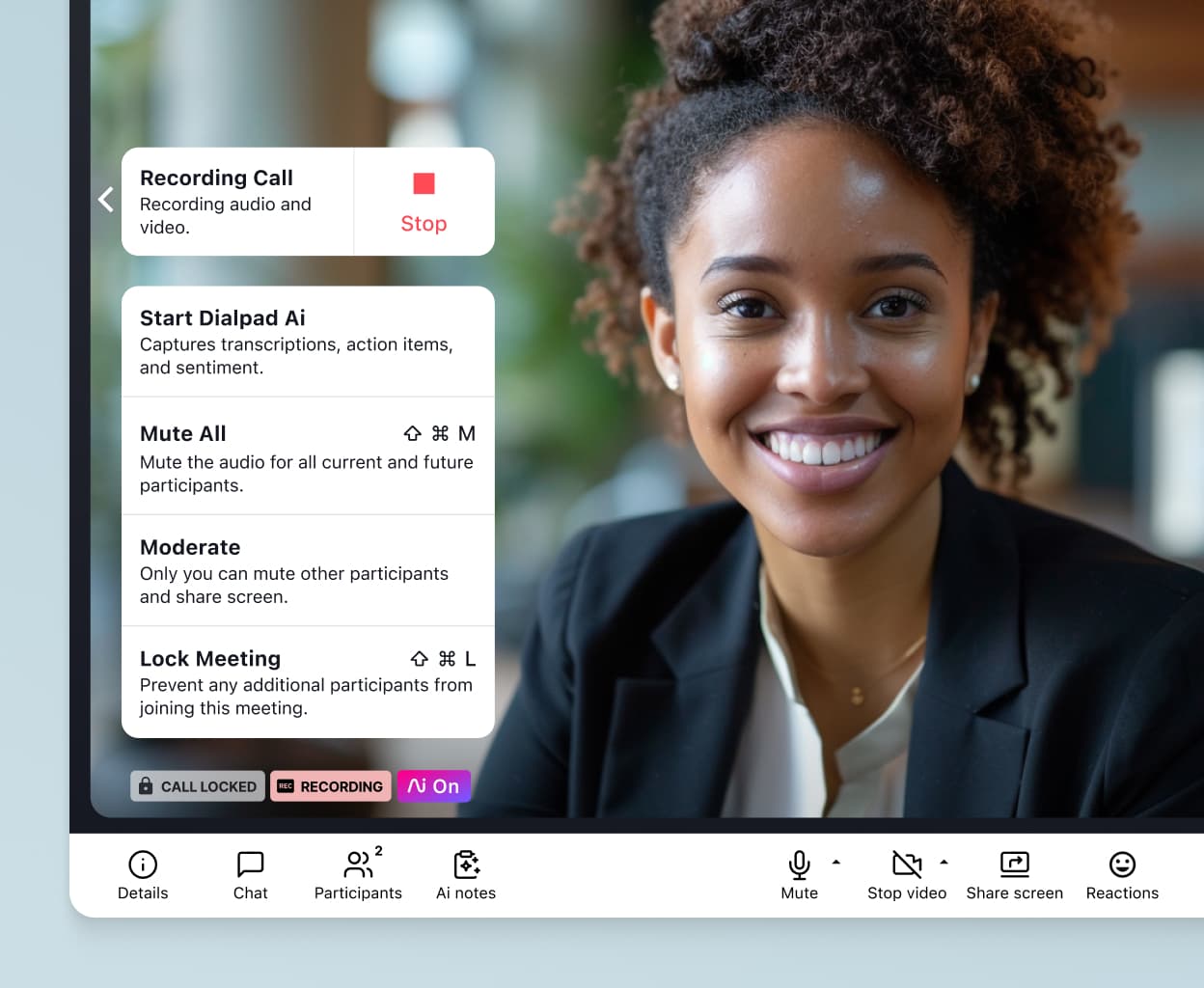
Looking for a conversational AI tool?
Why not try a customer engagement platform that has it built right in? Book a demo to see how it works, or take a self-guided interactive tour of Dialpad's app on your own first!
Examples of industry use cases for conversational AI
There are many examples of conversational AI use cases in different industries. Let’s look at a few ways it’s being used in healthcare, retail, HR, finance, and banking.
Conversational AI in healthcare
Conversational AI in healthcare can be used for a range of diagnostic, screening, and health management purposes.
Important conversational AI healthcare tools include symptom-reporting programs and intelligent appointment scheduling apps. These lessen the burden on healthcare providers by making sure patients see the right specialists and doctors aren’t overloaded with appointments that could've been resolved over a quick call or message.
Conversational AI in retail
In terms of retail, AI-powered virtual agents are great for providing support and guidance throughout the customer journey.
Not only can intelligent chatbots optimise your sales funnels by offering general information and promos or discounts, they can also reduce the volume of work for human agents by dealing with routine troubleshooting, after-sales support, and even customer surveying.
Conversational AI in HR
In very large global enterprises, there are a number of dedicated conversational AI recruiting and HR tools designed to help companies recruit, manage, and retain employees. (More on recruitment chatbots here.)
For HR departments looking to incorporate bots into their workflows, conversational AI chatbots can provide more efficient and engaging employee interactions and personalised conversational experiences.
When employees do need to contact HR, AI-enabled systems can empower HR team members by putting real-time, up-to-date information about policies, benefits, and more at their fingertips.
Conversational AI in finance and banking
When it comes to conversational AI for banks and other financial services providers, two key requirements are efficient (and effective) client service and a high level of security.
Thanks to natural language processing, AI virtual assistants can respond to bank account and other financial queries in seconds with personalised answers. This makes it possible for clients to receive an immediate and accurate resolution to routine requests such as cancelling a lost or stolen credit card.
Considering how much conversational AI costs compared to expanding contact center staff— and the fact AI works 24/7, in multiple languages, and across multiple channels—it’s able to massively increase the scope of an organization’s support operations for a relatively low cost.
How can a conversational AI platform improve your customer journeys?
There is a wide, wide range of conversational AI tools out there that all do slightly different things. In fact, according to Gartner, the conversational AI platform market currently constitutes an estimated 2,000 vendors worldwide.
We can help you narrow that search down a bit! If you're looking for an intuitive, easy-to-set-up conversational AI platform that you can integrate into your business processes quickly, why not check out Dialpad?
Not only do you get a fully integrated communications solution that lets you access telephony, instant + SMS messaging, video meetings, and contact center functionality—in a single interface—Dialpad's conversational AI is also a leader in the space, with its machine learning model having analysed over five billion minutes of proprietary voice and messaging data.
Want to provide a better customer experience with conversational AI?
Book a demo to see how easy it is to build chat workflows with the drag-and-drop tool in Dialpad, or take a self-guided interactive tour of the app on your own!
